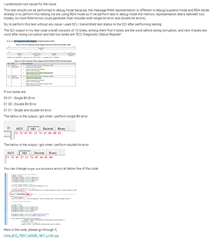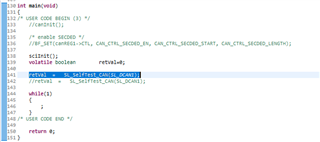I've integrated the Diagnostic Library source code into my current project, and I am only running the SL_SelfTest_CAN CAN_ECC_TEST_MODE_1BIT test on DCAN1 RAM. The issue I see is that when the 1Bit fault is created by reading from the corrupted data location, the fault that occurs is usually flagged with DEFLG instead of SEFLG in the DCAN1 ECC CS register (although sometimes it is correctly flagged with SEFLG). Pseudo-code from my startup procedure is below. Any guidance on how to correct this issue is greatly appreciated. Thanks!
Initialize Core Registers
Initialize Stack Pointers
Enable clocks to peripherals and release peripheral reset
Identify the source of the last reset
Initialize memory
Enable CPU Event Export
Check if there were ESM group3 errors during power-up
Initialize System - Clock, Flash, device-level multiplexing and I/O multiplexing settings
Back up DCAN1 Control register
Clear CAN_INIT_BIT, and enable ECC in DCAN1 Control register
Run SL_SelfTest_CAN CAN_ECC_TEST_MODE_1BIT test on DCAN1
Restore DCAN1 Control register








